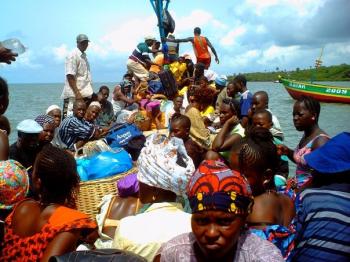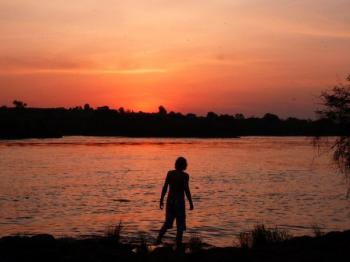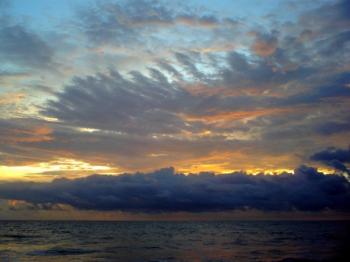“Seventeen years alone on an island have made him a little eccentric” was all our gruff but amiable South African host in Kampala told us of Dominique.
My friend Tommy, my girlfriend Anwen and I came to Uganda with ideals of beating our own track away from other travellers our age who seemed to flee to all sorts of exotic places only in search of a taste of home. The Ssese islands in Lake Victoria seemed to provide everything we were looking for; there was little enough about them in travel books to suggest they were a path less travelled but what we did find provided us with the usual Lonely Planet platitudes of ‘palm fringed beaches and crystal clear waters blanketed in azure skies’. However clichéd this sounds it seemed the ideal place to escape the soul-destroying tedium of England and education.
So it was that we arrived in Kasenyi with no real idea of what we were doing, but we knew to ask for a woman named Grace. After much shouting and assuring the locals that we did not intend to pay for the honour of finding Grace, we located her in a small and dirty roadside café made from a rusty freight container and selling only sundried tilapia fish and chips, which turned out to be all that is eaten throughout most of East Africa, if you’re lucky. She quickly assumed the role of Oracle, delivering ominous warnings about getting kidnapped on the boat or marooned on an unknown island as had happened to hapless travellers in the past. A perfect opportunity then for us determined hippies following everyone else in search of something new.

It soon became apparent that the Sseses were not the place to come if a relaxing idyll is your scene. They are the perfect retreat for drug smugglers, murderers, rapists and anyone else looking to leave the radar. The stigma attached to AIDS meant that many of those infected in Uganda sought refuge on the islands which has led to an infection percentage in the nineties. A comforting thought for the parents at home. We were beginning to wonder if our gracious host Dominique was going to be the benevolent, quirky ex-pat we had anticipated.
Before we had too much time to dwell on trivialities however, our legs were whisked beneath us and the three of us were lifted, bemused protestations ignored, into a small fishing boat, which was already creaking under the strain of its unhealthy passenger load, most of whom were armed with buckets for the inevitable conundrum of keeping afloat.
Apart from being threatened with immediate drowning if we didn’t pay three times the agreed fare, the locals on board were friendly, if a bit over interested. Those with no English just sat around us staring with bloodshot, drugged and listless eyes as we clung with awkward smiles to the edge of what was on closer inspection a rotting tree.
The one man who did talk to us was a deeply religious man who was determined to solve a problem that had clearly been troubling him for some time; “why is it that I am a black man and you are a white man?” This didn’t seem the time to embark on a rant of Darwinian vitriol so we shrugged and shuffled nervously as he moved on to tell of his plans to be an architect. He was not far, he convinced us, from perfecting his house which would in fact hover around fifty metres in the air. The means he contrived to achieve this were vague but he was convinced and this was not the place to question his ambitions.
The journey we were assured would be no more than four hours long. We had not been in Africa long enough to discover just how long four hours were. As night approached we realised we had no way of knowing whether the island we were dropped on was the correct one and whether the cooking pot we hoped for would be filled with our supper or awaiting our arrival that we may take a more active role in the main course.
Having crossed the equator with a disappointing lack of pomp we arrived at an island and everyone on the boat got out. This was when the fear began to set in, realising just how far we were from any form of authority with no means of contacting anyone if we needed to.

A while later, having sat bemused in the boat with no explanation, a ferryman jumped on the boat and we were making the final leg over to Banda. Our host, thankfully was waiting for us on the beach with torches lit to guide us in. He seemed a normal enough guy and greeted us warmly.
We began to relax and he was guiding us to our quarters when we heard a sharp growl and Dominique leapt with agility which belied his advancing years, into a nearby bush, seizing an enormous hound and wrestling it to its haunches with the obligatory gnarling and gnashing of teeth from both parties. It did not take us long to realise that seventeen years on his private island, far from making Dominique a lovable eccentric had made him completely insane, and we began to wonder why he had taken this lifestyle choice. We shouldn’t have asked.
Dominique had four or five black servants who were treated more as colonial slaves and clearly viewed him as a terrifying demi-god in the style of Colonel Kurtz. Our meal was served on a stone table by one of the slaves who clearly expected no thanks but was greeted and dismissed with a curt “well done”. Host is perhaps a flattering word for Dominique. On sitting down he barked at me “get me my liqueur, a task I hurried to attend to fearing the fate of the dog. Tommy was then ordered to fetch the fabled drug box, a command uttered with some relish.
He considered himself completely self-sufficient on the island and though he ordered most of his food from the mainland, his narcotics were his own and his labour of love. He claimed to have seventeen types of psychotropic drug growing in various strategic places on his unholy kingdom. His alcohol too was home grown banana-flavoured waraji, a local take on gin, around 70% volume.
We were joined at the table by Dominique’s only other distraction, a Swiss man in his sixties called Bruno. Bruno had come to Banda in search of solace and rehabilitation having spent three years in jail on Martinique where he was the only white inmate. His trauma from his time there was evident. When he spoke, it was in a soft melancholy tone and his eyes had a sadness that spoke volumes of his troubled past, a past which had seen various attempts made at suicide. It became clear that there was no place for a recovering wreck of a man whose wife had informed him she was leaving him as he was leaving jail and that she had AIDS.
After we had eaten, Dominique worked his way through an inhuman amount of marijuana and made sure we did not escape his prized drug store. As he smoked he began to open up and tell us of his life, as we smoked we became more and more paranoid and began to wonder what are chances of swimming to the mainland were. Slim.
Dominique had grown up in Kenya with British parents and had been sent to an English boarding school. It was there where he realised his talents for crime and his love of all things hallucinogenic. He successfully smuggled drugs from Kenya back to school and his career began to blossom, he embarked on large scale drug trafficking, covering the drugs in a resin and disguising them as traditional African doors being shipped over to the U.K. He dabbled in credit fraud and spent a while diamond smuggling and been a mercenary, we suspected involved with Executive Outcomes. To date he had received 68 criminal convictions and had clearly bought the island in search of a refuge. Just the sort of otherworldly character we were hoping for from Africa, but in person, in full drunken flow, he was a terrifying prospect.
There is some information on the island which Dominique wrote when he used to invite travellers to Banda which says that favourite pastimes on the island are: “stretching out in a hammock after a large meal, or soaking up some skin cancer on the sandy palm fringed beaches.” Lack of palm-fringed beaches aside, we were assured by a now feverish Dominique that his actual favourite pastime was homicide and assured us that we had to try to do it at least once, “just for the thrill of it.” His targets were the locals around him. He was racist. Deeply. Not in the style of a bluff Flashman type character, but more along the lines of Eichmann. He was determined to set up a battleships grid around his island so that he could perch on the castle he was building and blow the “nig-nogs” out of the water if they came too close to his island.
After fixing a polite smile on my face as if to say, ‘yes of course, why on earth didn’t I think of blowing people up before’, I said I was going to get a drink and he shouted for some more waraji. I asked one of the slaves who did not look pleased. He approached Dominique to tell him he had, unfortunately, gone through all three litres of the pungent juice and they had no more today. An enraged Dominique, puce in the face stood up growling and hurled one of the glass bottles with worrying accuracy against a tree near the hapless servant who made a hasty exit. I dread to think what the turnover rate in his personal staff is.

We made our excuses quickly and headed to our shack to try to get some sleep. The paranoia built from a combination of drugs, Lariam malarial prophylaxis and the bizarre situation we were in, was not entirely conducive to dreams of happy chocolate and raindrops made of jelly tots. I was for a while convinced that we were locked in some conspiratorial organization that was grooming us to be drug mules or sex traffic and Anwen still maintains that our room was raided by savage dogs in the middle of the night.
In the morning, bleary eyed and hoping it was all some hilarious initiation ceremony, we descended upon the camp to find Dominique sitting bright eyed, no sign of a hangover, staring at us with his maniacal grin. He reached beside him and pulled out the fateful box: “what’s breakfast without drugs?” he enquired cheerfully.
Having convinced him that, although our love for drugs was boundless, we were ‘ok for now, thank you’. We got him to arrange a fishing boat to pick us up and take us away to the relative reality of the mainland. When the boat arrived, Dominique shouted with glee for the dogs and bade them attack our ‘darkie intruders’, an unnecessary gesture even if you are a member of the national socialist party, and one evidently intended to impress his departing guests.
Really Dominique’s is a sad tale. Having clearly been a reasonably successful drugs runner, he has been living a hermit’s existence, descending into a Lord of the Flies style madness, which has left him scarred and very lonely, desperately cruel to those who surround him and still convinced that he is living the life of a king.
The Ssese islands, for all their natural beauty are a haunting experience, totally devoid of character. Lake Victoria is a massive black hole away from the noise and clamour of African cities sucking in criminals and outcasts into its chasm of all pervading silence.